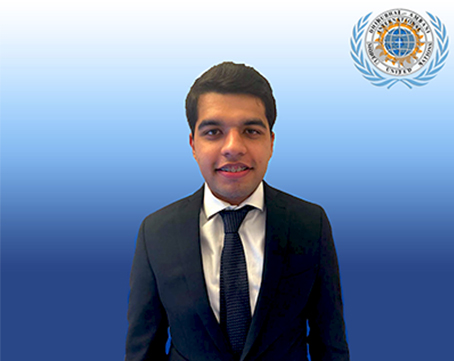
Secretary-General : Yash Fadia
“The liberal idea of tolerance is more and more a kind of intolerance. What it means is 'Leave me alone; don't harass me; I'm intolerant towards your over-proximity.”
- Slavoj Zizek
Dear delegates and MUN directors,
The fundamental principles of international politics themselves are challenged by Zizek in his succinct portrayal of the growing desire for states to limit foreign influence within their borders. After all, the forces of globalisation keep dealing monumental blows to the sovereignty of states, creating greater economic, social and political integration the world over. The United Nations was founded on the 24th of October, 1945 on the bedrock of this very international cooperation and institutional liberalism, but the words of Zizek call into question the relevance and harmonizing ability of the UN in the pandemic-stricken world of 2021.
Shared sovereignty can, by all means, be compared to a sword - it’s something nations can metaphorically live or die by. The infiltration of foreign powers into a nation, whether for the provision of vital emergency relief or to exploit scarce economic resources, always intertwines with the political fibers of the United Nations with the hope of a verdict on the legitimacy of the action. While this may allow asymmetrically powerful states to wield their influence, it also presents an opportunity for the minorities to voice their oppression rather than succumbing to the unparalleled power of a singular entity. The effectiveness of these mechanisms for international cooperation has created growing disillusionment with the United Nations.
The present geopolitical scenario presents myriad examples of this disillusionment. Look no further than the multitude of debt-traps that China has created across Asia and the African subcontinent. The crippling nature of this vicious form is evident in the Sri Lankan theatre - their Hambantota Port is now controlled by debtors or more accurately, landlords, from China. As the pandemic drives an even thicker wedge between developed and developing nations, economic imperialism has become the new normal. Does modern politics truly have enough morality to earn the sobriquet of “shared sovereignty”? Or have the scales of power shifted so much that any form of equilibrium is forever impossible?
Consider the seemingly perennial threat of global warming, with the devastating failure of the Kyoto Protocol looming over it. The inability of nations to compromise, especially to a situation that hampers their collective futures, is a cry for help. The need for shared sovereignty has never been more important. Consider the controversies associated with the Eurozone crisis in Greece post loans from the IMF. Simply another example of how foreign influence shakens the very foundation of a nation.
As delegates at DAIMUN 2021, your role is clearer than ever. Understanding the nature and importance of international cooperation is the cornerstone to your success not only at the conference, but also as future world leaders. DAIMUN promises to instil within you a dynamic and powerful sense of belonging to the world of international politics where you must develop an answer to question:
How effective can shared sovereignty truly be in our post-pandemic world?
The stage for DAIMUN 2021 is set.
Yours sincerely
Yash Fadia
Secretary-General
DAIMUN 2021